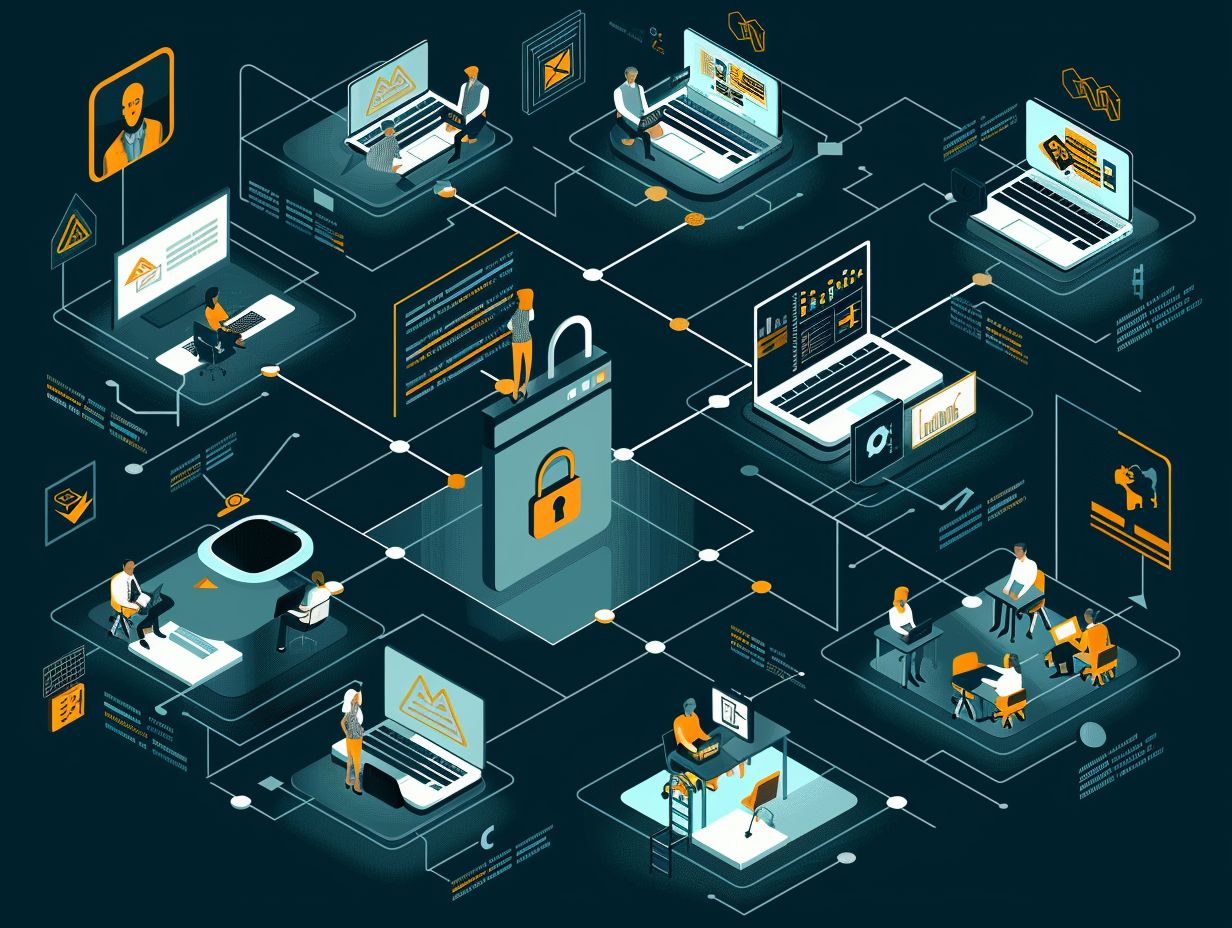In today’s digital age, you cannot overlook the critical importance of cybersecurity in the finance industry. As cyber threats constantly evolve, there is a high demand for professionals who possess knowledge in both cybersecurity and finance.
This article delves into the diverse career prospects within this field, encompassing positions like Information Security Analyst, Cybersecurity Engineer, and Risk Management Specialist. The discussion will also cover the essential skills, qualifications, and educational trajectories necessary for you to navigate and excel in a successful career in cybersecurity and finance.
Key Takeaways:

The Importance of Cybersecurity in Finance
In the finance sector, cybersecurity plays a critical role in safeguarding sensitive financial data from cyber threats and ensuring the integrity and confidentiality of financial transactions.
With the rise of digital banking and online transactions, financial institutions face increasing risks such as data breaches, identity theft, and ransomware attacks. These cyber threats can not only result in significant financial losses but also damage the reputation and trust of customers.
The consequences of a security breach in the finance industry extend beyond immediate financial impacts, leading to regulatory penalties, legal liabilities, and erosion of customer loyalty. Therefore, implementing robust cybersecurity measures is essential to protect the financial ecosystem and maintain trust in digital financial services.
Career Opportunities in Cybersecurity and Finance
Exploring career opportunities in the intersection of cybersecurity and finance can lead to diverse roles that blend technology expertise with financial acumen, offering a rewarding and dynamic career pathway for IT professionals.
Professionals in this field may find themselves working in areas such as cybersecurity risk analysis for financial institutions, implementing secure payment systems, or strategizing on digital asset protection. With the rise of digital transactions and online banking, the need for experts who can protect sensitive financial data has never been greater.
Understanding financial concepts like risk management, compliance, and fraud detection, in conjunction with cybersecurity principles, is crucial to navigating the complexities of securing financial systems effectively. These roles often require a mix of skills ranging from coding and networking to financial analysis and regulatory knowledge.
Roles and Responsibilities
Understanding the roles and responsibilities within cybersecurity and finance is essential for professionals like yourself looking to navigate this specialized field effectively. Different job titles come with distinct duties and accountabilities.
For example, as a cybersecurity analyst, you are responsible for monitoring network security, identifying potential threats, and implementing measures to safeguard against cyber attacks. On the other hand, within the realm of finance, you, as a financial analyst, play a crucial role in assessing market trends, analyzing financial data, and providing insights to support decision-making.
Both these roles require strong analytical skills, attention to detail, and the ability to stay updated on the latest trends and technologies in their respective fields. Professionals in cybersecurity may face the challenge of constantly evolving cyber threats, while those in finance must navigate complex regulatory frameworks and market volatility.
Required Skills and Qualifications
For individuals aspiring to excel in cybersecurity and finance careers, acquiring the necessary skills and qualifications is paramount. A blend of technical expertise, analytical skills, and industry-specific knowledge is crucial in these fields.
To thrive in the dynamic realms of cybersecurity and finance, it is essential to stay updated with the latest trends and advancements in cybersecurity tools and financial regulations. Continuous learning through training programs, workshops, and online courses can help you broaden your skill set and stay competitive. Obtaining industry-recognized certifications such as CISSP, CISA, CISM for cybersecurity roles, and CFA, CPA for finance roles, can enhance your credibility and increase job prospects. Additionally, gaining hands-on experience through internships or project work is invaluable for honing practical skills and understanding real-world scenarios.
Top Cybersecurity Jobs in the Financial Sector

In the financial sector, you rely on essential cybersecurity positions like Information Security Analyst, Cybersecurity Engineer, and Risk Management Specialist to protect your financial institution from cyber threats and ensure data security.
The Information Security Analyst plays a critical role in monitoring your organization’s networks for security breaches, conducting risk assessments, and implementing security measures to safeguard sensitive information.
Cybersecurity Engineers are focused on developing and implementing advanced security solutions, conducting penetration testing, and responding to cyber incidents. To explore the CompTIA’s cybersecurity career pathway from entry-level to expert, click here.
Risk Management Specialists are responsible for assessing potential risks, developing risk mitigation strategies, and ensuring compliance with cybersecurity regulations to protect the financial sector from financial losses and reputational damage.
1. Information Security Analyst
As an Information Security Analyst in the financial sector, you are tasked with monitoring security access, conducting risk assessments, and implementing security measures to safeguard sensitive financial data.
Your role is crucial in protecting financial institutions against cyber threats and ensuring compliance with industry regulations. It is your responsibility to continuously monitor networks for any suspicious activities and respond promptly to potential security breaches. Your expertise in analyzing data and identifying vulnerabilities is essential in developing strong security protocols.
By staying up-to-date on emerging threats and advancements in security technology, you contribute to fortifying the financial sector’s defenses against cyberattacks.
2. Cybersecurity Engineer
As a Cybersecurity Engineer in the financial sector, you focus on designing and implementing secure network solutions, conducting security audits, and responding to cyber incidents to fortify the defenses of the financial institution.
You are responsible for continuously monitoring the organization’s network for potential vulnerabilities, analyzing security systems for weaknesses, and developing mitigation strategies. Utilizing your expertise in encryption techniques, firewalls, intrusion detection systems, and penetration testing, you safeguard sensitive financial data from cyber threats.
Plus the technical aspects, Cybersecurity Engineers play a vital role in creating and enforcing security policies, educating staff on cybersecurity best practices, and ensuring regulatory compliance to protect the financial institution’s assets and reputation.
3. Risk Management Specialist
As a Risk Management Specialist in the financial sector, you assess potential risks, develop risk mitigation strategies, and ensure compliance with regulatory requirements to protect financial assets and maintain operational resilience. By constantly monitoring market conditions and evaluating potential threats, you play a crucial role in safeguarding the organization’s financial health.
You analyze complex datasets and collaborate with cross-functional teams to identify vulnerabilities and implement measures to mitigate risks effectively. Your deep understanding of financial markets and regulatory frameworks enables you to navigate dynamic environments and anticipate potential disruptions. You also conduct stress tests and scenario analyses to simulate adverse situations and enhance preparedness.
Your proactive approach and strategic foresight are instrumental in safeguarding financial security and sustaining long-term viability in the ever-evolving financial landscape.
Educational Paths for a Career in Cybersecurity and Finance
When considering a career in cybersecurity or finance, expanding your knowledge through specialized educational paths is essential. This may involve pursuing a Bachelor’s Degree in Cybersecurity, a Master’s Degree in Information Security, or obtaining relevant certifications to bolster your expertise and credibility within the industry.
Formal education serves as a solid foundation, providing a deep understanding of cybersecurity practices and financial principles. By pursuing advanced degrees, such as a Ph.D. in Cybersecurity or an MBA in Finance, individuals can gain specialized knowledge and increase their eligibility for leadership positions in these competitive fields.
Acquiring industry-recognized certifications like CISSP (Certified Information Systems Security Professional) or CFA (Chartered Financial Analyst) can showcase your proficiency and commitment to potential employers, giving you a competitive edge in the job market.
1. Bachelor’s Degree in Cybersecurity

A Bachelor’s Degree in Cybersecurity equips you with foundational knowledge in areas like network security, cryptography, and cyber threat intelligence, preparing you for entry-level roles in the cybersecurity and finance domains.
Throughout the curriculum, you will delve into topics such as ethical hacking, risk management, digital forensics, and incident response, honing your technical skills and analytical thinking.
You will gain hands-on experience through practical labs and projects, allowing you to apply theoretical knowledge in real-world scenarios. The immersive nature of the program not only fosters a deep understanding of cybersecurity concepts but also cultivates problem-solving abilities critical for addressing ever-evolving cyber threats.
Upon graduation, you will emerge with a versatile skill set that is highly sought after in industries ranging from government agencies to private corporations.
2. Master’s Degree in Information Security
A Master’s Degree in Information Security focuses on advanced topics such as digital forensics, incident response, and security management, providing you with specialized expertise for leadership roles in cybersecurity and finance.
By diving into these advanced areas, you not only deepen your understanding of cybersecurity threats but also gain valuable research opportunities to contribute to cutting-edge solutions. This specialized knowledge equips you with the skills needed to protect sensitive data and systems from evolving cyber threats effectively.
Completing a Master’s Degree in Information Security opens up a multitude of career opportunities, including roles in information security analysis, cybersecurity consulting, risk management, and more, allowing you to advance your career in various industries.
3. Certifications in Cybersecurity
Obtaining certifications in cybersecurity, such as CompTIA Security+, CISSP, or CISA, enhances your skills and credentials, opening doors to diverse job roles and higher salary potential in the cybersecurity and finance sectors.
Cybersecurity certifications are highly valued in the industry, with organizations seeking qualified professionals like yourself to safeguard their digital assets. Holding certifications like GIAC or CEH demonstrates your expertise in ethical hacking and penetration testing, which are crucial for defending against cyber threats. Certifications like CCSP focus on cloud security, aligning with the increasing use of cloud technologies in finance. These certifications not only validate your knowledge but also boost your credibility, making you stand out in a competitive job market.
Frequently Asked Questions
What are the different career paths in cybersecurity in the financial sector?
Some of the common career paths in cybersecurity in the financial sector include cybersecurity analyst, security architect, risk analyst, security engineer, and security consultant.
What skills are necessary for a cybersecurity career in the financial sector?

Strong technical skills, analytical thinking, problem-solving abilities, attention to detail, and knowledge of financial regulations are some of the key skills required for a successful cybersecurity career in the financial sector.
What certifications are beneficial for a cybersecurity career in the financial sector?
Certifications such as Certified Information Systems Security Professional (CISSP), Certified Information Security Manager (CISM), and Certified Information Systems Auditor (CISA) are highly valued in the financial sector for cybersecurity professionals.
What are the top challenges faced by cybersecurity professionals in the financial sector?
The constantly evolving nature of cyber threats, the need to comply with strict regulations, and the shortage of skilled cybersecurity professionals are some of the top challenges faced by those working in cybersecurity in the financial sector.
What additional training or education is recommended for a career in cybersecurity in the financial sector?
Continued education and training in areas such as financial risk management, data analysis, and compliance can enhance one’s knowledge and skills, making them more competitive in the cybersecurity job market in the financial sector.
What are the growth opportunities for cybersecurity professionals in the financial sector?
The demand for cybersecurity professionals in the financial sector is expected to continue to grow significantly in the coming years, providing numerous opportunities for career advancement and specialization in areas such as cloud security, data privacy, and incident response.
